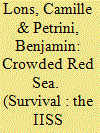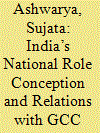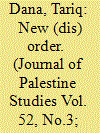|
|
|
Sort Order |
|
|
|
Items / Page
|
|
|
|
|
|
|
| Srl | Item |
| 1 |
ID:
188802


|
|
|
|
|
| Summary/Abstract |
It is unsurprising that the Red Sea region has come into sharper strategic focus for great powers as well as regional powers, given that 12% of global seaborne trade, 40% of Europe’s trade with Asia and the Middle East, and 8% of seaborne hydrocarbons pass through the Red Sea. Yet the region is chronically underdeveloped and conflict-ridden. Overlapping rivalries involving Iran, Israel and the Gulf Cooperation Council countries pose risks of intensifying regional discord. The United States has prioritised empowering its regional partners and strengthening emerging Israel–Gulf security synergies to counteract Iran’s activities and check China, which has become a key economic actor in the region and opened its first overseas military base, in Djibouti, in 2017. Given the potential divergence between American and regional concerns, however, neither US nor regional involvement appears likely to stabilise the region.
|
|
|
|
|
|
|
|
|
|
|
|
|
|
|
|
| 2 |
ID:
190753


|
|
|
|
|
| Summary/Abstract |
After the Arab uprising of the early 2010s which changed the geopolitical shape of the Eastern Mediterranean, the Abraham Accords in 2020 marked the second most momentous development of the past decade, which drove more external players to the scene of geopolitics of the Mediterranean region. The Abraham Accords improved Israel’s relations with some Arab states of the Persian Gulf such as the UAE, Bahrain and Saudi Arabia and paved their way, under the full support of the United States, to heavily partake in geopolitical and geostrategic equations, mainly in energy and security nature, of the Eastern Mediterranean formulated mainly by Greece under the Neo-Democracy government. The present research explores the changing character of geopolitics in the Mediterranean and how Greece is playing its role in restructuring such a character. The findings of this research suggest that Greece is playing a prominent and leading role in transforming the geopolitics of the Eastern Mediterranean through security and energy initiatives for protection against possible aggression from Turkiye. Considering the supreme importance of the Mediterranean commercially and militarily for the United States, this article argues that the new design of geopolitics in the region is being shaped to protect Greece and Israeli interests in favour of the USA in the Eastern Mediterranean.
|
|
|
|
|
|
|
|
|
|
|
|
|
|
|
|
| 3 |
ID:
190891


|
|
|
|
|
| Summary/Abstract |
India’s conception of its peaceful role in international affairs, which evolved during the Nehruvian era, is not an end in itself, but rather a wholesome strategic choice consistent with its economic development and great power ambitions. Despite emphasising a radical shift in foreign policy, the government of Prime Minister Narendra Modi deemed it essential to prioritise peace in international relations, particularly with the Gulf Cooperation Council countries. The Abraham Accords, involving the UAE and Bahrain, have created a new geopolitical environment that affirms India’s conception of security through peace and permits engagement in key areas while ensuring economic gains.
|
|
|
|
|
|
|
|
|
|
|
|
|
|
|
|
| 4 |
ID:
190983


|
|
|
|
|
| Summary/Abstract |
Israel’s relations with the Arab world underwent dramatic changes during its seventy-five years of existence – from hostility and enmity to peacemaking and reconciliation. This development is the result of the strengthening of Israel’s regional and international position on the one hand, and the weakening of the Arab world and the Arab states’ withdrawal into themselves in the face of the socioeconomic problems confronting them, on the other. And while the regional fear of Iran’s hegemonic drive has played an important role in the evolution of Israeli-Arab cooperation, the potential for consolidation of the nascent relationship goes well beyond the Iranian threat as both sides share weighty political, security and economic interests such as fighting radical Islam, promoting regional stability and security, and ensuring economic prosperity. Yet while the Palestinian issue didn’t prevent the consolidation of Arab-Israeli relations, it remains the lowest common denominator for Arab public opinion in its search for identity and meaning. As such, it will continue to threaten regional stability and the building of Israel’s relations with its Arab partners.
|
|
|
|
|
|
|
|
|
|
|
|
|
|
|
|
| 5 |
ID:
192582


|
|
|
|
|
| Summary/Abstract |
This article argues that Jordan should advocate for transforming the Abraham Accords’ regional integration initiatives into a regional security architecture that brings prosperity and security to all its members—including the Palestinians. Jordan is well positioned to influence the Accords’ strategic planners given its credibility, diplomatic assets, and strategic location; it will continue to be a lynchpin in regional security and future integration plans.
|
|
|
|
|
|
|
|
|
|
|
|
|
|
|
|
| 6 |
ID:
193009


|
|
|
|
|
| Summary/Abstract |
The normalization of relations between the United Arab Emirates (UAE) and Israel under the Abraham Accords is part of a long-standing security cooperation between the two regimes to monopolize regional power. Indeed, with the rapidly changing political and security landscape in the Arab world, the Abraham Accords have become central to understanding alliance formation in the region. The Accords have significantly enhanced the already existing security and military relations between Israel and the UAE, with heavy Emirati investment in advanced Israeli weapons systems and security technologies, military and intelligence sharing, as well as economic partnerships in strategic sectors. While the alliance is often portrayed as a defensive security arrangement aimed at countering the “Iranian threat,” a closer examination reveals that it is much more than that. Sponsored by the United States, the alliance entrenches Israeli settler colonialism and Arab authoritarianism as mutually inclusive pillars for the region, with the ultimate objective of reproducing US hegemony in the face of changing global dynamics.
|
|
|
|
|
|
|
|
|
|
|
|
|
|
|
|
| 7 |
ID:
176626


|
|
|
|
|
|
|
|